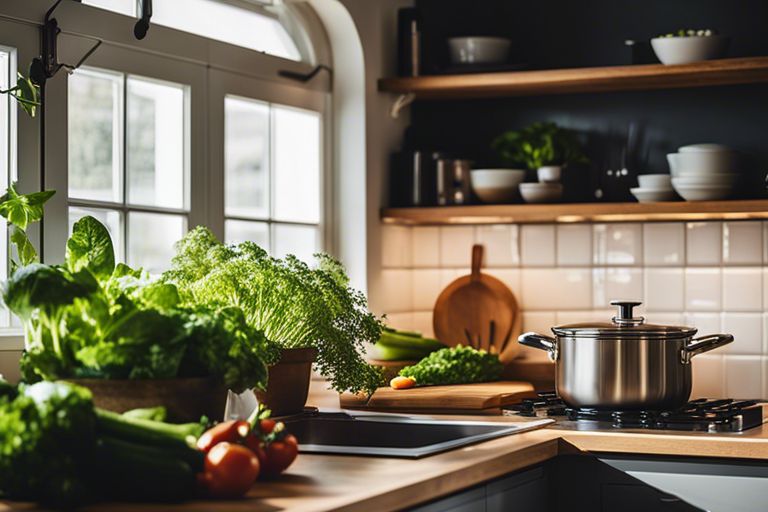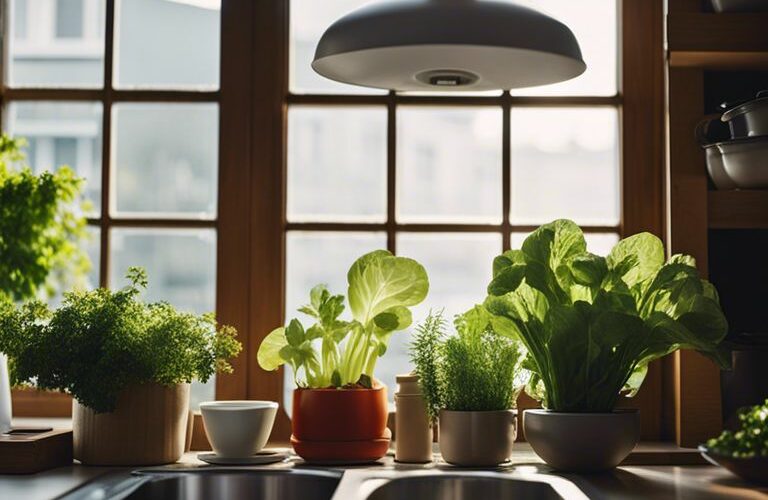In today’s world, where the environmental impact of our actions is more critical than ever, finding ways to reduce gas consumption in our home kitchens is crucial. Gas stoves are a common addition to many households, but they contribute significantly to greenhouse gas emissions and can be hazardous if not used properly. By adopting eco-friendly cooking practices, we can not only help reduce our carbon footprint but also create a safer and healthier environment for ourselves and future generations. In this blog post, we will explore simple yet effective ways to minimise gas usage in the kitchen, from adjusting cooking techniques to utilising energy-efficient appliances. Let’s take a step towards a greener and more sustainable lifestyle by making mindful choices in our daily cooking routines.
Table of Contents
Understanding Home Kitchen Energy Use
As far as reducing gas consumption in your home kitchen, it’s important to understand how your energy use is distributed across different appliances. By gaining insights into how cooking affects energy consumption and identifying gas-guzzling appliances, you can take steps towards a more eco-friendly kitchen.
How Cooking Affects Energy Consumption
Cooking is a fundamental activity in any home kitchen, but it can also be a major contributor to energy consumption. Whether you’re using a gas stove, oven, or microwave, each cooking method consumes a significant amount of energy. Choosing the right cooking technique and being mindful of energy-saving practices can make a dramatic difference in your overall gas consumption.
Identifying Gas-Guzzling Appliances
Some kitchen appliances are notorious for consuming large amounts of gas. Gas ovens and range cookers, for example, are among the biggest culprits when it comes to gas consumption in the kitchen. By identifying these gas-guzzling appliances and optimising their use, you can make a significant impact on your gas bills and reduce your carbon footprint.
Gas hobs are also common offenders when it comes to gas consumption in the kitchen. It’s important to be mindful of how you use your gas hob, opting for smaller burners when possible and ensuring that you’re not wasting energy by using a larger burner than necessary.

Techniques for Reducing Gas Consumption
Efficient Cooking Habits
With respect to reducing gas consumption in your kitchen, efficient cooking habits play a crucial role. One key practice is using the right size of burner for your pots and pans. A small pan on a large burner wastes energy as heat escapes around the sides. Similarly, using lids on pots can help retain heat and cook food more quickly.
Another important habit is to avoid peeking or opening the oven door frequently while cooking. Each time the oven door is opened, the temperature can drop by as much as 25 degrees Celsius, leading to increased cooking time and gas usage. It’s best to use the oven light and look through the window instead.
Utilizing Energy-Saving Cookware
Choosing energy-saving cookware can make a significant difference in reducing gas consumption. Opt for pots and pans with flat, thick bottoms as they heat more evenly and retain heat well, allowing you to cook at lower temperatures. Cookware made from materials such as copper or aluminium are known for their excellent heat conduction properties, making them energy-efficient choices.
Additionally, using pressure cookers and slow cookers can help save energy by significantly reducing cooking times. Pressure cookers cook food faster due to the high pressure and steam inside, while slow cookers use low heat over a longer period, making them both energy-efficient options for your kitchen.
With respect to utilising energy-saving cookware, it’s vital to consider the materials and design of the pots and pans you use. Investing in high-quality, energy-efficient cookware can not only help reduce gas consumption but also improve the cooking process and the quality of your dishes. Choose cookware that is durable, versatile, and specifically designed to save energy to make a positive impact on both your cooking experience and the environment.
Kitchen Design and Equipment Choices
Pertaining to eco-friendly cooking, the design of your kitchen and the appliances you choose play a crucial role in reducing gas consumption and minimising your carbon footprint. By making informed decisions about your kitchen layout and equipment, you can create a more sustainable cooking environment while also saving on energy costs.
Selecting Appliances for Maximum Efficiency
Choose energy-efficient appliances that have high Energy Star ratings to ensure maximum efficiency in your kitchen. Look for features such as induction cooktops, convection ovens, and refrigerators with advanced insulation to reduce energy wastage. Investing in modern appliances may require an initial outlay, but the long-term savings on energy bills make it a smart choice for both your budget and the environment.
Design Tips for an Eco-Friendly Kitchen Layout
When designing your kitchen layout, focus on maximising natural light and ventilation to reduce the need for artificial lighting and air conditioning. Choose energy-efficient lighting fixtures and position your cooking area near windows to make the most of daylight. Opt for sustainable materials such as bamboo or reclaimed wood for cabinets and countertops to reduce environmental impact while adding a touch of style to your kitchen.
- Maximise natural light and ventilation
- Choose energy-efficient lighting fixtures
- Opt for sustainable materials such as bamboo or reclaimed wood
Utilising eco-friendly design principles in your kitchen layout not only helps to reduce gas consumption but also creates a healthier and more sustainable living space for you and your family. By incorporating elements such as recycling bins, composting areas, and efficient storage solutions, you can further enhance the eco-friendliness of your kitchen. Knowing that you are making a positive impact on the environment can be a rewarding and motivating factor in your journey towards sustainable living.
Beyond Cooking: Holistic Approaches to a Green Kitchen
In the matter of creating an eco-friendly kitchen, it’s crucial to look beyond just the way you cook. Adopting holistic approaches can make a significant impact on reducing your carbon footprint and creating a more sustainable living space.
Waste Reduction and Composting
Reducing waste and implementing composting systems are crucial steps in creating a green kitchen. By separating food scraps and other organic materials for compost, you not only reduce landfill waste but also create nutrient-rich soil for your garden. Additionally, investing in reusable containers and choosing products with minimal packaging can significantly reduce the amount of waste generated in your kitchen.
Sustainable Food Choices and Resources
Embracing sustainable food choices and resources is another key aspect of a green kitchen. This involves opting for local, seasonal produce to reduce carbon emissions associated with transportation. Choosing organic products can help minimise exposure to pesticides and support environmentally-friendly farming practices. Moreover, utilising plant-based alternatives to meat and dairy products can decrease water usage and greenhouse gas emissions linked to animal agriculture.
By making informed decisions about the food you consume and the resources you utilise in your kitchen, you can contribute to a more sustainable food system and reduce the environmental impact of your lifestyle. Do not forget, every small change you make in your kitchen can have a positive ripple effect on the planet.
Eco-Friendly Cooking – Reduce Gas Consumption In Your Home Kitchen
In the final account, by implementing eco-friendly cooking practices, such as using energy-efficient appliances, cooking with lids on pots, and avoiding preheating the oven, you can significantly reduce gas consumption in your home kitchen. Not only will this help you lower your utility bills, but it will also contribute to a greener environment by reducing your carbon footprint. As we strive to create more sustainable living habits, making small changes in our day-to-day cooking routines can have a big impact. So, let’s all play our part in conserving energy and preserving our planet for future generations.
FAQ
Q: Why is eco-friendly cooking important?
A: Eco-friendly cooking is important as it helps reduce gas consumption in your home kitchen, thus lowering your carbon footprint and contributing to a healthier environment.
Q: What are some eco-friendly cooking methods?
A: Eco-friendly cooking methods include using energy-efficient appliances, cooking with lids on pots and pans, and opting for microwave or slow cooking whenever possible.
Q: How can I reduce gas consumption in my kitchen?
A: To reduce gas consumption in your kitchen, consider using a pressure cooker for faster cooking times, ensuring your gas appliances are well-maintained, and turning off the gas when not in use.
Q: What are the benefits of eco-friendly cooking?
A: The benefits of eco-friendly cooking include saving on energy costs, promoting sustainable living practices, and creating a healthier living environment for you and your family.
Q: How can I make my kitchen more eco-friendly?
A: You can make your kitchen more eco-friendly by investing in energy-efficient appliances, using reusable cookware and utensils, composting food waste, and opting for locally sourced ingredients.

Our contributing author is a passionate advocate for eco-friendly living and sustainability. With a background in eco-life, they are dedicated to inspiring and empowering individuals to adopt environmentally conscious lifestyles. Through insightful articles, they share practical tips, innovative solutions, and thought-provoking perspectives to promote a greener, more sustainable world. Join them on the journey towards eco-smart living and discover how small choices can make a big impact. 🌱








